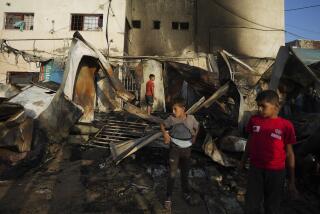Brady Seeks $25 Billion in Allied Aid
- Share via
LONDON — The Bush Administration began asking its major economic allies Tuesday for at least $25 billion to help defray America’s military expenses in the Persian Gulf and to aid countries that have been hit hard by the global trade embargo on Iraq and Kuwait.
On orders from President Bush, Treasury Secretary Nicholas F. Brady led a delegation of top officials on a whirlwind tour to meet with leaders of France, Britain, South Korea and Japan to discuss the U.S. request. He is scheduled to return early Saturday.
Brady told reporters that the Administration has developed specific targets for each nation and expects to begin negotiations during the remainder of this week. “What we have to do is compare notes,” he said. “We will have an outline on the numbers by the time we come back.”
U.S. officials said the Administration request contained two basic elements:
* Washington wants the allies to pay $15 billion between now and the end of 1990 to help cover the “incremental costs”--mainly transportation and airlift expenses--for the massive U.S. troop buildup in Saudi Arabia.
* It also is seeking at least $10 billion by the end of 1991 to help bolster the economies of the so-called front-line states, such as Egypt, Turkey and Jordan, that have been hit the hardest by the trade embargo imposed after Iraq’s invasion of Kuwait on Aug. 2.
Senior U.S. officials cautioned that the figures are likely to fluctuate, depending on oil prices and the military situation in the Persian Gulf.
The Administration’s decision to make an overt, worldwide plea for cash has sparked a heated controversy both at home and abroad. Critics say the move makes it appear that U.S. soldiers are being used as mercenaries for the benefit of Japan and other allies.
But top Administration officials argue that Washington is just trying to establish machinery for “burden-sharing” under which other nations contribute to support the international enforcement action.
“The thought is that we have the diplomatic and military pieces of our strategy well in place, and now what needs to be put in place is an economic piece, which will fill out the three branches of our strategy,” Brady told reporters Tuesday.
Brady began his tour in Paris Tuesday with a meeting with French Budget Minister Pierre Beregovoy and Foreign Affairs Minister Roland Dumas, but neither side would elaborate on what, if anything, France had agreed to contribute.
After the Paris meeting, a U.S. official said that the American and French officials did discuss “overall numbers” for French assistance. But he refused to provide further details. Brady later flew to London for a session with British Prime Minister Margaret Thatcher.
Japan, the richest of the nations on Brady’s itinerary, last week became the first ally to make a specific pledge of financial assistance when it said it would provide at least $1 billion. However, U.S. officials said privately that they were disappointed by the size of the package.
Brady told reporters Tuesday that he is optimistic about the response that the U.S. request for money is likely to receive. He said Bush has already spoken to the leaders of each of the countries he plans to visit and each signaled a willingness to be “very forthcoming.”
“I think these meetings will be most successful,” he said.
Later in the week, Brady plans to meet with South Korean President Roh Tae Woo in Seoul and, finally, with Japanese Prime Minister Toshiki Kaifu in Tokyo before returning to Washington on Friday.
Administration officials say Washington first wants to organize its allies to provide short-term assistance for the front-line states in the Middle East and later may ask the International Monetary Fund and the World Bank to coordinate long-term aid to the region.
They said that the United States must take the lead in spurring its allies to develop an international aid package for the region. “This will take some leadership so that there is no more loss of time” in providing assistance, one U.S. official said.
Brady told reporters that he was pleased by the French response. “We had a very successful meeting, we were very pleased . . . that Minister Dumas felt in the same way that we do” about the need to back up Western efforts with economic support, he said.
Dumas, however, would say only that the two sides had a “very constructive discussion” and refused to elaborate on whether France was prepared to commit any funds to the American effort in the Persian Gulf.
More to Read
Get the L.A. Times Politics newsletter
Deeply reported insights into legislation, politics and policy from Sacramento, Washington and beyond. In your inbox twice per week.
You may occasionally receive promotional content from the Los Angeles Times.










